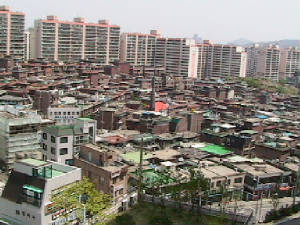
It's been a while since I've done some serious posting on this blog, mainly as I've been settling in to South Korea to do my doctoral research (yes, I do have a life outside of the blogosphere). At any rate, with jet lag and other adjustments having been made I'm only now able to begin contemplating issues and posting information. Thus, I have to apologize for all the reprints as of late, I was starting to feel like the Korea Herald's newswire. Then again, this blog is still largely a current affairs/events type blog, so what can you do?
Although I try to make my posts more newsy, the following are some general points on the issue of irregular labour which we've been covering quite a lot over the past year.
A while back while I was doing some research on the net on the non-regular workers bill I came across two interesting articles in the Korea times about the opposition of employer's groups to the upcoming bill on irregular employment. As you know that non-regular workers bill has been consecutively delayed due to opposition from all sides. The bill will basically put into law much of the flexibilization that already exists and pervades Korean society and to which labour are, justly, opposed and who feel the chance will have been missed to create new foundations for equitable rights and status for all workers. Albeit the bill is designed to iron out inequalities in some areas of contingent work, by putting minimums on the amount of time an employee can work temporarily in one workplace, but, without a general principle of 'equal pay for equal work' included in the bill it is hard to figure out how to prevent institutionalizing a dual labour market structure whereby some workers enjoy solid benefits and others are left precarious, even while doing the same job. By most indicators, inequality -- which is quite easily to see just by looking at the contrasts in housing type, mostly between middle class apartments and poorer houses or villas, in and around Seoul -- continues to expand, the topic of recent and fairly well done piece in the Korea times.
Now, the government may argue that it will pick up the slack by offering benefits in key areas of social security in return for the consent of labour groups to flexibilization, however, government policymakers aside, the surprise here is that private capital also seems to be against the formalization of flexibility and would prefer a business as usual approach, at least from what I can gander from the press. Business as usual here would mean that the contingent status of perhaps millions of workers would remain in a legal loophole, in other words, the business community has no coherent policy except to ignore the laws that currently exist and advocate that new laws not be created, thus relegating, or legally abandoning, the situation of contingent workers to very grey legal status. Seems the cost of having to pay those workers who have worked at particular firms full time for multiple years the full pay they deserve -- ie regularizing their employment status as a trade off for greater concessions for flexibility in the future and in other segments of the economy -- is not even viewed as preferable.
Employers actually threatened a "strike by capital" against the bill last February, claiming that they would continue to move overseas if the government continued to push the bill. Though such threats are normally kept in the back room, it seems that Korean employers were fine with printing this in the Korea Times which makes one wonder a bit how much they care about their public image or the role they want to be seen as playing in Korea's often very nationalist political economy. Or perhaps, the reason why the political economy is not seen as very nationalist these days may also have to do with the ways in the which the government is able to regulate its economy's financial structure. In other words, perhaps changes have been made that create less incentive for corporations to want to want to obey labour law once the stick of financial discipline has been removed. But this too, remains to be seen completely, and I myself, am left guessing at exactly where state capability or coherent political power in this area lies (perhaps a topic for further research).
Perhaps these are the beginning of the days when the international of capital will have to be met with a more coherent internationalization of labour, but then again, these trends are nothing new, segyehwa (or globalization) has been used quite a lot in introducing new plans and policies (remember the hub of Asia), but this form of internationalization does not normally follow a rhetoric of exit, it is more about the entry of capital. What is new, perhaps, is the way in which they being used in the public sphere as a threat of abandonment. Or maybe not, but if so, I'd like to see more examples.
